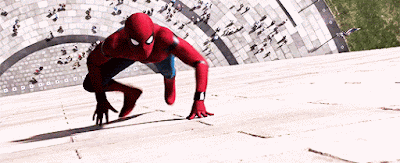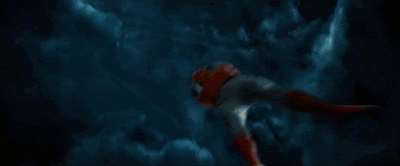or
"Uncertainty. That is appropriate for matters of this world. Only regarding the next are vouchsafed certainty."
or
"Misanthrope? I don't hate my fellow man, even when he's tiresome and surly and tries to cheat at poker. I figure that's just a human material, and him that finds in it cause for anger and dismay is just a fool for expecting better."
There is a sense of nostalgia that prepares you for The Coen Brothers' new Western anthology film The Ballad of Buster Scruggs (which makes its premier on Netflix and is playing a very few theaters in the U.S., presumably for Oscar award consideration). It starts with a nicely-composed shot of a dog-eared book bearing the same title as the film, familiar for the plain dust-jacket (from a time before marketing became the thing to sell the book) that will be recognized to anyone who's had to clear out the bookshelf of a recently-passed relative, or from a Sunday afternoon perambulation through a used book store. You can practically smell the dust and age of the pages, as a hand crawls into frame and gingerly opens the book to the artistically rendered end-papers and then to the "meat" of the book, where the page-turning pauses on the dedication page, which has these words:
To Gaylord Gilpin
Who shared with us these stories,
And many more alike, one night
in camp above the roaring fork
'til approach of morn stained the sky
and our esteem for him stained our trousers.
This Book is Dedicated
There are six stories in the book, the titles giving no clue as to what they might be about. Turn the page and we see a list of the color illustration plates included in the volume. A tissue protects the illustration and we see the first burst of material showing us the contents, a single image and an arbitrary line of prose that only hints at what's inside, creating a mystery and a void to be filled, a goal to move on to. And we begin...with "The Ballad of Buster Scruggs."1. The Ballad of Buster Scruggs
Buster Scruggs (Tim Blake Nelson) is a singing cowboy riding out of Monument Valley into what passes for civilization in the day and age, his legs wrapped around his horse, his arms wrapped around his guitar and his throat wrapped around the traditional ballad "Cool Water." Buster is a white-hat cowboy, loquacious of song and speech (by which he is constantly addressing the audience as in "Don't let my white duds and pleasant demeanor fool ya. I, too, have been known to violate the statutes of man... and not a few of the laws of the Almighty!"). His story demonstrates his "downright Archimedean" skills with a gun, and his reputation as the "San Saba songbird" as he creates a quick comic elegy for one of miscreants of poor nature who have the fool-hardiness to draw on him.*
One can see why the Coens were tempted to start with this one, as it is the funniest and most arch of the six stories, recalling to mind the Looney-Tunes nature of Raising Arizona, and with a lovely, goony performance by Nelson that endears you to him, even if, occasionally, it creeps one out. It sets up the tone for the entire film, where The West challenges the expert and the novice alike and Death comes in unexpected and inconvenient ways and should also prepare viewers that, as such, they can be surprising and grisly, as well. "The Ballad of Buster Scruggs" is a comic primer for the anthology, showing the film's approach to dusty death and the film's larger message of the nature of wilderness, and the efficacy of trying to rise above it.
"You seen 'em, you play 'em" sneered the hard man.
2. Near Algodones
An outlaw (James Franco) decides he's going to knock over the only game in town (except there's no town)—a bank that looks like it fell right out of the sky to land in the middle of the plains. But, it's just not his day. He has to contend with the institution's sole teller (Stephen Root), who's been through the procedure before, and who, in the opinion of the would-be robber, "doesn't fight fair."
The outlaw will have very good luck today, but not so's you'd notice.
After waking up, he finds his neck in a noose, with a hanging party all ready to carry out its sentence. Fate steps in to get him out of the jam, but also put him deep into another one. He will ultimately learn that there's a good side to everything as long as he has the time to appreciate it.
"Pan-shot!" cried the old man.
3. Meal Ticket
A humble wagon makes its way through the scarce pockets of civilization that mark a mountain landscape. It is a traveling show, featuring a cultured orator, Harrison (Harry Melling), who has the added fascination that he is a quadriplegic. The show is fairly simple—the curtain of a small stage parts to reveal the orator, and after a dramatic pause that allows for gawking, he gives dramatic recitations of the story of Cain and Abel, and other sources as diverse as Shakespeare, Shelley, and Abraham Lincoln, to the spare audiences looking for diversion from the night and the cold.
Harrison is under the care of his manager (Liam Neeson), who drives the wagon, posts the bills, prepares the stage, does Harrison's make-up, and provides sound effects for the parts in which God appears and needs accompaniment. He also collects the spare change that the audience provides for their night's entertainment, enough to provide a hot meal cooked over a campfire. The manager does that, too, and feeds Harrison by hand. Lodgings would be too expensive and the audiences are noticeably dwindling the farther they head through the mountains.
The two are tied together in partnership, but the days are long and the rewards are meager.
"Meal Ticket" is a story of entrepreneurship, reduced in all its hard-scrabble desperation, and the eye toward improving business at all costs with little regard to anything but the sound of coins in pockets, and it resonates as timely as the day's financial headlines that emphasize the bottom line at the cost of human dignity...and life.
"The quality of mercy is not strained, it droppeth as the gentle rain from heaven."
All Gold Canyon
Based on a Jack London story, "All Golden Canyon" tells the story of a grizzled prospector (Tom Waits), who enters a pristine valley with the intention of culling the riches hidden within it, without regard to the wonders that surround him.
He sets up an elaborate system, digging through the dirt, and noting the glittering specks of gold that he is able to pan out of it, to find the vein of gold that he knows must be there, the source of which he calls "Mr. Pocket," that will allow him to leave the valley a very rich man—if he can survive long enough to hit pay dirt.
And in all that mighty sweep of earth, he did not see a sign of man nor the handiwork of man.
The Gal Who Got Rattled
A mail-order bride, Alice Longabaugh (Zoe Kazan) travels with her brother by wagon train to meet her intended husband. But the journey is long and accompanied by cholera, natives, and her brother's dog, named Benjamin Pierce, whose instinct, owing to its city nature, is to bark at anything wild, upsetting the prickly members of the wagon train, already impatient by the deprivations of the long journey.
When her brother dies, Alice is left alone, on her own, with no experience, few prospects, and a singular disposition towards fretting, which endears her to the ramrod of the train, Billy Knapp (Bill Heck), who takes it upon himself to solve her cares and problems, much to the mute consternation of the train boss, Mr. Arthur (Grainger Hines), who has other considerations than those of a worrisome girl, out of her depth, and out in the wilderness.The longest and most intricate of the stories, "The Gal Who Got Rattled" is based on a story by Stewart Edward White, and one could comment, here, on the top-tier performances and the exquisite photography (shot digitally, a Coen first) by Bruno Delbonnel, who's been doing a lot of work with the Coens, Jean-Pierre Jeunet, Tim Burton and Joe Wright, but that praise can be said for the entire anthology, no matter the conditions or weather they were recorded in. The film is beautiful to look at, frequently threatening to overwhelm the stories, but never quite doing that, becoming an intricate part of the story-telling fabric, the wide expanses of prairie and horizon looming and often overpowering the melancholy insignificances of the tiny figures making their ways through them.
Mr. Arthur had no idea what he would say to Billy Knapp.
The Mortal Remains
Five passengers (played by Saul Rubinek, Tyne Daly, Chelcie Ross and Jonjo O'Neill and Brendan Gleeson) on board a stage-coach as they make their way from a sunset prairie to the enfolding night on their way to Fort Morgan.
The five could not be less compatible as they hold conversations as to the nature of man and the nature of love on the one side of the stage, while on the other the two partners, Thigpen and Clarence reveal themselves to be "reapers"—bounty hunters, who on this very ride are carrying their latest victim (on the roof of the cabin) to be dispatched at Fort Morgan...but is that the only one designated by the gentlemen who clearly revel in their work?
Unlike the other segments, "The Mortal Remains" is shot entirely on a sound-stage, even the fronts of the fort's houses are decidedly two-dimensional, but it ends the film on a decidedly creepy, if ambivalent note, the kind of campfire story best saved for when the last embers glow out and leave only wraiths of smoke.
Whether or not he heard, the coachman did not slow.
The Ballad of Buster Scruggs is one of those. Not a "return to form," so much as one of those where everything works and their experimentation reveals the strengths of the inspiration they've decided to sardonically play around with—in this case, the Western's ability to show us that whatever we may gain, we lose something in the transition, making the genre both the perfect home of triumph entangled with tragedy, sometimes inseparably.
It is, indisputably, one of the best films of the year. Ironically, good luck finding it in a theater.
*
Surly Joe, the gambler, he will gamble nevermore,
his days of stud and hold'em they are done.
It was long about last April, he stepped into this saloon,
but he never really took to anyone!
Surly Joe, Surly Joe!
Oh, wherever he's gamblin' now, I don't know!
He was slick but I was slicker,
he was quick, but I was quicker,
and the table stopped his ticker, Surly Joe!
Surly Joe, Surly Joe!
Won't be missed by anyone, will Surly Joe!
Humankind he frowned upon,
but not now, his face is gone!
Guess your frowning days are done, oh Surly Joe!
Surly Joe, Surly Joe!
A cedilla on the "c" of Curly Joe!
He was mean in days of yore,
now they're moppin' up the floor
One more sight to make him sore, oh Surly Joe!
Surly Joe, Surly Joe!
Where the rest his face has got to, we don't know!
He was never any fun, now his grumpy race has run,
kisser blown to kingdom come oh Surly Joe!






































